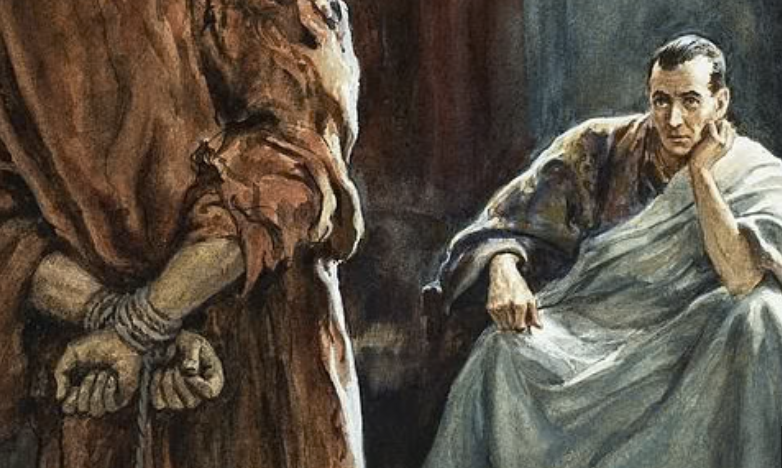
We have moved away from working through the Gospel according to Mark, and so we pop over to John’s Gospel before the season of Advent starts. This Sunday is colloquially known as Christ the King Sunday. It all started with a Pope. Pope Pius XI instituted this feast in 1925 with his encyclical Quas primas (“In the first”) to respond to growing secularism and atheism. You wonder what he might have made of the world today.
The passage we may refer to is John 18:33-37, so not too many verses. We are eavesdropping (literally listening from under the eaves) into a conversation between Pilate and Jesus. I just wanted to give some context here. Pilate’s approach to Jesus has changed over the Gospels. That may well be due to the time that they were written. Given that Mark was early 70s, Matthew 80s, Luke 80-85s, and John anything from 90s-100, much time has passed, and importantly the pressures that Rome could bear upon the emerging ‘Jesus’ groups. In Mark’s Gospel, Jesus remains silent and Pilate is said to have offered to release a prisoner to commemorate the Jewish Passover. In fact, Bart Ehrman notes that apart from the Gospels, there is no evidence that Pilate or any other Roman governor ever did this. Was Pilate trying to defend Jesus?

In Matthew’s version, largely based upon Mark’s story, the addition of Pilate washing his hands, seems to indicate that Pilate is really powerless. This presents a vivid picture of a Governor of Judea, now Prefect, who seeks to allow the crowd to dictate his actions. In John’s Gospel, there is a real dialogue between the two – but who was taking verbatim notes at the time? Roman writers of the time. notably Josephus, said that it was Pilate alone who condemns Jesus. As time moved on from Mark to John’s Gospel, what also changed was the separation, even antagonism, between Jews and ‘Christians’. The bottom line was that, like every other insurrectionist, Rome’s treatment was the same : crucifixion. So, we read this text, with one eye on the circumstances, the context, of that time; and what the writers may wish to have emphasised.
“Not enough to simply claim that Jesus is your saviour, but that Jesus is your Lord”
Tony Campolo
Are you the King of the Jews?
That’s quite a leading question, given the circumstances of the discussion. If a judge were to ask “did you kill the person?”, we are asking a direct question with a serious, significant, consequence. In this case, who is the one who is declaring that Jesus is the King: you or others?
Being King is as much as what they do, as it is their very being. Whereas we might look at what someone does, Jesus speaks of the kingdom of God: the here and the future.
In this discussion, Pilate asks Jesus “Are you a King?”, to which Jesus responds (verse 37) that “I might testify” – in the Greek, be a martyr. It speaks also of Jesus came into the world, or in the Greek, Cosmos – so not just the Earth. Pilate (in verse 38) asks that wonderful question “What is truth?” It may well be a question introduced in this Gospel in particular as it is felt that ‘truth’ is a favourite word in Johannine literature.
That truth is seen by Pilate as one he can rationally deduce, it is grounded within earthly wisdom; whereas, Jesus sees truth that can be irrational, a revelation. Truth does not give Jesus power, like any other King; truth offers that ability to see forgiveness, love and grace, for the king that Jesus relates to is one of being a servant.
Over to us
When we declare that Jesus is our king, let us consider whether we see that kingdom being filled with a particular group of people, your tribe perhaps?
Can we see the world’s events in terms of the truth as Jesus describes truth? It takes much effort, I would agree, especially at this time.